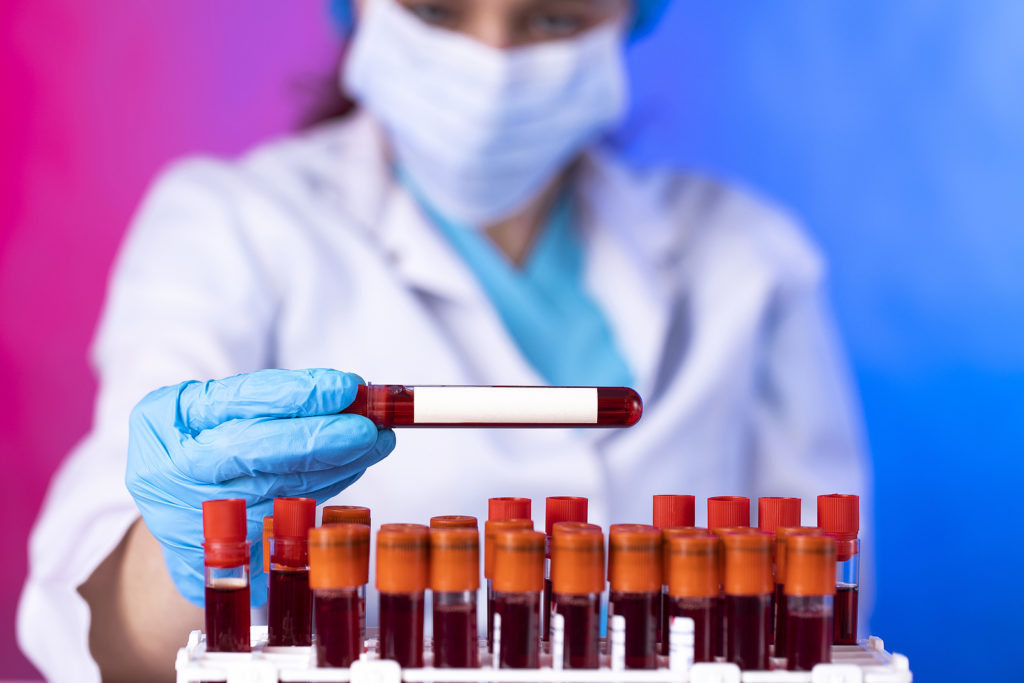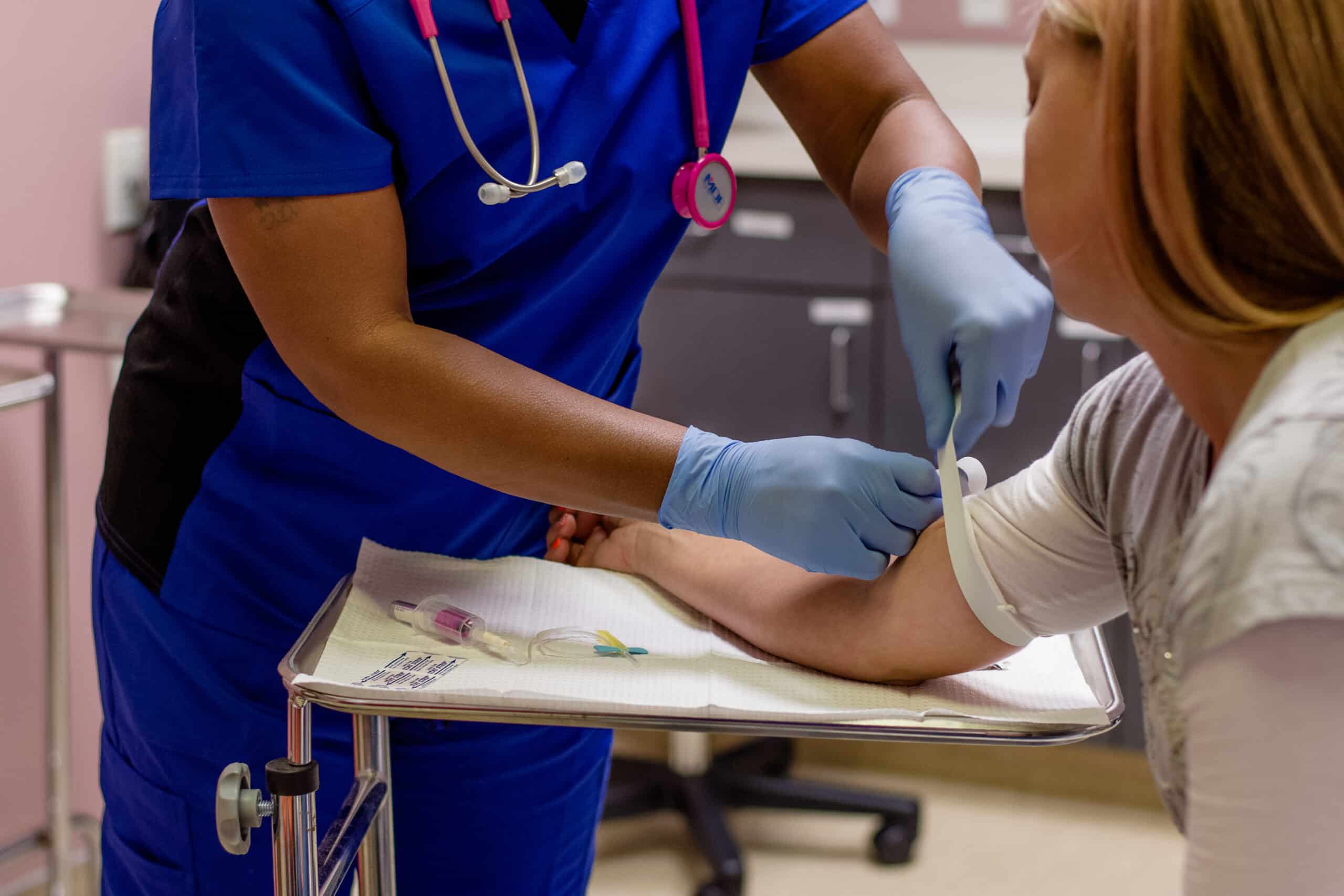What No One Tells You About Phlebotomy Classes Near Me
What No One Tells You About Phlebotomy Classes Near Me
Blog Article
The Path to Qualification: Understanding the Phlebotomy Training Training Course Journey and Its Significance
As you take into consideration the course to qualification in phlebotomy, it is necessary to understand the function you'll play in health care. Your training will cover necessary skills, from blood collection techniques to patient interaction. Each part of the program prepares you for the obstacles in advance. What precisely does the trip involve, and why is qualification so vital for your future profession? Let's explore these inquiries additionally.

The Role of Phlebotomists in Medical Care
Phlebotomists play an important duty in the medical care system, working as the vital link between individuals and important analysis screening. You'll perform blood attracts, ensuring samples are collected accurately and securely. Your know-how aids in identifying medical conditions, checking health, and leading treatment choices.
In your daily communications, you'll need to establish count on with individuals, making them really feel comfortable during what could be a demanding experience. You are accountable for classifying and managing examples very carefully to protect against contamination or errors, which could impact test outcomes.
Beyond this, you'll frequently function along with medical professionals and registered nurses, communicating crucial information about clients' conditions. By understanding your skills, you add meaningfully to patient treatment, making you a vital component of the medical team.
Overview of Phlebotomy Training Programs
When exploring phlebotomy training programs, you'll locate different types made to fit various routines and learning designs. Each program helps you create vital abilities like blood collection and individual communication. Recognizing these options is essential to picking the right path for your job.
Kinds Of Training Programs
Numerous types of training programs are offered for those looking to become skillful in phlebotomy. Furthermore, some health centers and clinics supply on-the-job training programs, providing functional experience while you find out. Whatever path you select, each program intends to equip you with the required skills for an effective phlebotomy career.

Secret Skills Established
Understanding phlebotomy requires a set of key skills that are developed through extensive training programs. You'll find out technological abilities like correct vein selection, needle insertion, and blood collection techniques. These hands-on practices guarantee you can carry out procedures safely and efficiently. Additionally, interaction abilities are essential; you'll require to engage with individuals, describe treatments, and placed them at simplicity. Comprehending composition and physiology is vital, as well, as it assists you locate veins and understand the body's response to blood attracts. You'll acquire knowledge of safety and security methods and infection control, guaranteeing you maintain a clean and sterile atmosphere. Each of these skills is important for your success as a certified phlebotomist, making you an important asset in any kind of medical care setting.
Trick Parts of a Phlebotomy Training Course
In a phlebotomy course, you'll concentrate on vital subjects that lay the groundwork for your future job. You'll engage in hands-on training that permits you to apply what you've found out in real-world settings. Both the curriculum and sensible experience are important for your success as a phlebotomist.
Curriculum Overview
While going after a phlebotomy training program, you'll experience a curriculum made to equip you with essential abilities and knowledge. Phlebotomy Classes Near Me. This curriculum commonly includes anatomy and physiology, concentrating on the blood circulation system and recognizing blood components. You'll likewise learn more about various sorts of blood collection approaches, consisting of venipuncture and capillary leak methods
In addition, infection control and safety and security protocols are vital elements, guaranteeing you understand exactly how to preserve a clean and sterile setting. You'll research patient communication, stressing interaction and compassion, which are critical for easing client anxiety. Moral and lawful considerations will be dealt with, preparing you for real-world responsibilities. This foundational knowledge will allow you to succeed as a phlebotomist and give top quality care in medical settings.
Hands-On Training Experience
Getting hands-on experience is an indispensable component of your phlebotomy training course. This functional training allows you to apply what you have actually learned in a real-world setup, enhancing your skills and self-confidence. Phlebotomy Training Course.
In addition, you'll get the possibility to interact with clients, which is essential for developing your interaction abilities. This combination of technical effectiveness and interpersonal skills is essential for your success as a certified phlebotomist. Eventually, hands-on training is where concept meets technique, solidifying your understanding and preparedness for certification.
Accreditation and Licensing Needs
Prior to you can start your profession in phlebotomy, it is essential to understand the certification and licensing requirements that vary by state. A lot of states need phlebotomists to hold an accreditation from an identified company, such as the National Phlebotomy Association or the American Culture for Medical Pathology. These qualifications normally involve passing an exam that examines your understanding and skills in the area.
In enhancement to certification, some states have specific licensing requirements. You may require to complete a certain number of hours in medical practice, submit proof of training, or undergo a background check. It is essential to research your state's policies to ensure you satisfy all required requirements.
Staying informed about these requirements not only helps you protect a setting but also enhances your integrity as a specialist. By satisfying these demands, you'll be well on your method to a successful career in phlebotomy.
Hands-On Training and Practical Experience
Hands-on training and practical experience are essential parts of your phlebotomy education and learning, as they allow you to apply academic understanding in real-world circumstances. During your training, you'll involve in monitored venipuncture, discover proper techniques, and come to be acquainted with various blood collection tools. This straight involvement is critical for constructing your self-confidence and developing your skills.
You'll function carefully with skilled professionals that can assist you with read this article the subtleties of individual interaction and example handling. Each practice not only enhances your understanding however also prepares you for the busy atmosphere of healthcare settings.
Additionally, several programs include medical turnings, enabling you to experience varied setups, from healthcare facilities to outpatient clinics. This direct exposure helps you adapt to different difficulties and individual needs, ensuring you're well-prepared for your future function. Accept these opportunities, as they're important to becoming a skilled and compassionate phlebotomist.
Challenges Dealt With Throughout Training
While obtaining hands-on experience is vital, it is very more information important to acknowledge the challenges that can occur throughout your phlebotomy training. You could run into anxiousness when executing treatments on genuine clients, specifically if you're brand-new to the environment. The pressure to get everything right can be overwhelming. Furthermore, understanding the skills needed for blood draws takes technique; you might deal with strategy initially.
Time administration can likewise be an obstacle, as harmonizing concept, functional sessions, and individual dedications can really feel daunting. You might deal with varying discovering speeds amongst your peers, causing sensations of insecurity if you believe you're falling behind. Lastly, adapting to the different characters of trainers can be tough, as each might have an one-of-a-kind training design.
Acknowledging these challenges early can prepare you for success and assist you establish resilience throughout your training journey.
Profession Opportunities After Qualification

As you acquire experience, you could even think about focusing on areas like pediatric or geriatric phlebotomy, accommodating particular person needs. Some phlebotomists select to progress their professions by coming to be laboratory professionals or pursuing additional education and learning in healthcare fields.
In addition, your certification can cause roles in training or overseeing brand-new phlebotomists, allowing you to share your understanding. With the medical care industry continuously growing, your abilities will constantly remain in need, leading the way for a secure and fulfilling profession. Welcome the opportunities waiting for you!
Often Asked Inquiries
What Is the Common Period of a Phlebotomy Educating Course?
Phlebotomy training courses normally last around four to eight weeks. You'll engage in hands-on method, class guideline, and on-line knowing. Completing this training prepares you for qualification and a satisfying job in healthcare.
Are Online Phlebotomy Courses Available?
Yes, online phlebotomy courses are available. They provide versatility and benefit, enabling you to examine at your own speed. Simply confirm the program is recognized to fulfill qualification demands and get useful abilities for your job.
Just How Much Does Phlebotomy Training Commonly Price?
Phlebotomy training typically sets you back in between $700 and $2,500, depending upon the program and place. You ought to think about elements like course size, consisted of materials, and hands-on experience when selecting the best training for you.
What Prevail Requirements for Phlebotomy Training?
Common see it here requirements for phlebotomy training typically include a high college diploma or GED, immunizations, and a background check. Some programs may also need basic medical care knowledge or qualifications, ensuring you're planned for hands-on training.
Can I Work While Completing My Phlebotomy Training?
Yes, you can function while completing your phlebotomy training. Several trainees equilibrium tasks with their researches, but make sure to manage your time properly to guarantee you fulfill both work and training commitments effectively.
Report this page